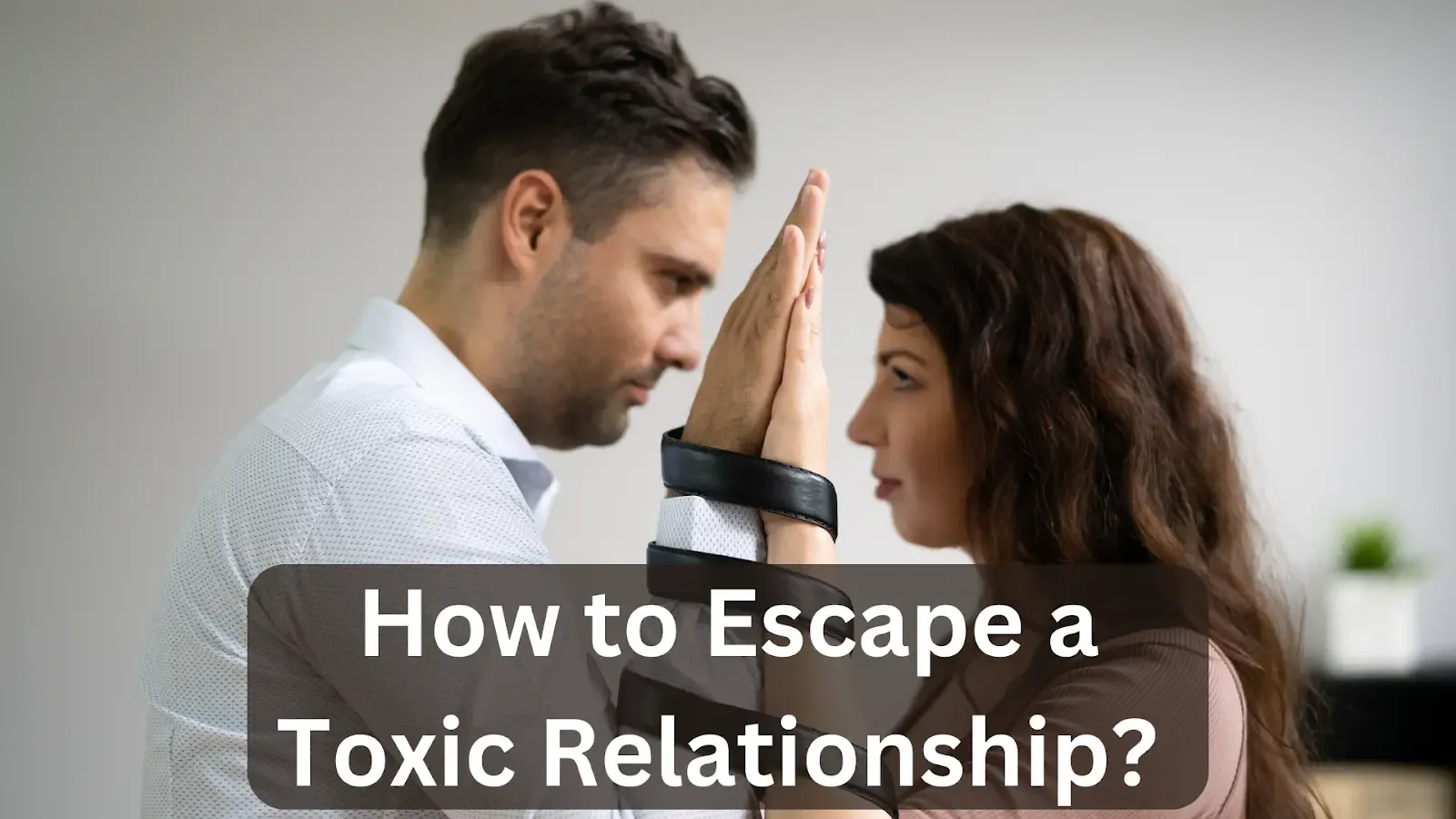
Today we’re talking about a more sensitive topic: toxic relationship and more importantly, how to escape one.
Ah, relationships.
They’re supposed to be filled with butterflies, romantic dinners, and lazy Sunday mornings in bed.
But sometimes, instead of a fairy tale, you find yourself living in a twisted, toxic reality show that even you would turn off.
As a woman who’s seen more toxic relationships than I care to admit, I’m here to walk you through the signs, survival strategies, and the road to rediscovering yourself after ditching Mr. (or Ms.) Toxic.
Let’s dive in, with humour and heart, and explore this not-so-glamorous world of toxic love, because you deserve way better!
What Is a Toxic Relationship?
Ever had a friend who starts a sentence with “Not to be mean, but…” and then proceeds to be, well, mean?
A toxic relationship is like that but on steroids.
A toxic relationship is any relationship (romantic, familial, or friendship) where you feel more drained than supported.
Instead of mutual respect and love, there’s manipulation, control, jealousy, and emotional chaos.
It’s like you’re in a romantic tango, but you keep stepping on each other’s toes. Except, he’s doing it on purpose.
The sneaky thing about toxic relationships is they don’t always start that way.
Often, it begins with charm, flattery, and a whole lot of promises.
You feel like you’ve won the love lottery, but soon enough, you realize it’s all one-sided, and the prize is heartache.
Early Warning Signs
Sometimes the signs of a toxic relationship are so subtle, they’re easy to dismiss or even romanticize.
We all want to believe the best in someone, and hey, who doesn’t love a little drama in the beginning?
But drama can quickly turn into a full-blown soap opera, and trust me, you don’t want to be the main character in that mess.
Here are some more red flags you might be ignoring:
The Love Bomb
At first, it seems like a dream come true.
They shower you with compliments, grand gestures, and undivided attention.
You feel like you’ve won the jackpot of affection.
But here’s the catch: it’s not sustainable.
Eventually, the love bombs turn into emotional landmines, and you’re left wondering why they’re suddenly cold and distant.
This is classic manipulation, designed to make you dependent on those fleeting moments of over-the-top love.
Boundary Bulldozing
You say you need some alone time, and they sulk or guilt-trip you. “Don’t you want to be with me?” they ask, making you feel like taking care of your mental health is an act of betrayal.
Toxic people don’t respect boundaries!
They see them as obstacles to bulldoze.
And before you know it, your “me time” is gone, replaced with endless, needy togetherness.
The Jealousy Games
Sure, a little jealousy can be cute, until it’s not.
Toxic partners can turn even the most innocent interactions into “evidence” of your supposed disloyalty.
A harmless conversation with a coworker?
Suddenly, you’re “flirting.”
A girls’ night out?
Cue the passive-aggressive texts asking why you didn’t invite them.
Jealousy in small doses can seem flattering, but when it’s used as a weapon, it’s a massive red flag.
Guilt-Tripping Galore
Toxic partners are masters of the guilt trip!
They make you feel bad for having your own needs, interests, or even feelings.
You had a rough day and need some space?
Well, now they’re upset because you’re not giving them attention.
You cancel plans to deal with a family emergency?
Suddenly, you’re the “unreliable” one.
It’s an exhausting, never-ending cycle of you trying to keep them happy while neglecting your own emotional needs.
Keeping Score
In a healthy relationship, partners support each other without keeping track of who’s done what.
But in a toxic relationship, everything is a competition.
Did they buy you flowers once?
Well, now you “owe” them for it.
Did they do the dishes last week?
Guess what, you’re expected to remember that forever.
Everything becomes transactional, and they’ll always remind you of the “debts” you owe, whether it’s attention, time, or emotional labor.

Hot and Cold Behavior
One day, they’re all over you, texting nonstop, showering you with affection, and making you feel like the center of the universe.
The next day, they’re distant, ignoring your calls, or being short and irritable for no reason.
This push-pull dynamic keeps you on edge, constantly trying to “win” back their affection.
It’s not love!
It’s manipulation designed to make you crave their attention even more.
Constant Criticism Disguised as “Help”
At first, they might frame it as “just trying to help” or “being honest,” but over time, their so-called constructive criticism turns into a relentless critique of everything you do, say, or wear.
Your cooking’s never quite right, your job isn’t impressive enough, and don’t even get me started on the way you load the dishwasher.
Before long, you’re second-guessing everything about yourself.
Playing the Victim
No matter what goes wrong in the relationship, they always seem to be the victim.
They have an excuse for every bad behavior.
Maybe they had a tough childhood, or they’ve been hurt before, and now you’re the one paying the price.
They’ll use their past pain as a shield to avoid taking responsibility for how they treat you.
It’s hard to call them out because you don’t want to seem heartless, but you are not their therapist.
You Feel Like You’re Walking on Eggshells
One of the biggest warning signs of toxicity is when you start to censor yourself.
You’re careful about what you say or how you act to avoid setting them off.
Maybe you even catch yourself apologizing for things that aren’t your fault.
When you start living in a state of anxiety, constantly adjusting your behavior to keep them happy, it’s time to ask yourself: why are you sacrificing your peace for someone else’s comfort?
These are the little (and not-so-little) clues that the relationship might be going south.
It’s so easy to write off these behaviors as quirks or temporary rough patches, but if you notice more than one or two of these signs, it’s time to reevaluate.
You deserve to feel safe, loved, and respected in a relationship.
Not like you’re auditioning for their approval every single day.
The Emotional Toll
Let’s be real: being in a toxic relationship is like emotional quicksand.
The longer you stay, the deeper you sink, and the harder it becomes to pull yourself out.
What most people don’t tell you is that toxic relationships don’t just leave scars. They mess with your entire sense of self.
It’s not just heartbreak; it’s a full-on identity crisis, and the aftermath is way more complicated than just “getting over it.”
Toxic partners are experts at making you doubt yourself.
It’s like they have a PhD in gaslighting.
They convince you that you’re the problem, you’re overreacting, and maybe, just maybe, you’re actually the toxic one.
Suddenly, every argument becomes a reflection of your supposed flaws.
You start thinking, “Maybe I am too sensitive,” or “I guess I do make things difficult.”
Spoiler alert: it’s not you, it’s them!
But by the time you realize that, the seeds of doubt have already taken root, and they’re tough to weed out.
Remember that confident, vibrant version of yourself from before the relationship?
Yeah, she (or he) is harder to find these days.
Toxic partners have a way of chipping away at your self-esteem, bit by bit.
They criticize your choices, belittle your achievements, and make you feel like you’re lucky to have them, rather than the other way around.
Over time, you stop believing in your own capabilities, and your self-worth becomes tied to their approval.
It’s like you’re walking around in a fog, forgetting how awesome you were before they started dimming your light.
We talk a lot about physical exhaustion, but emotional exhaustion is its own beast. And toxic relationships are the ultimate drain.
Constant arguing, walking on eggshells, and trying to please someone who’s never satisfied is flat-out exhausting.
You wake up tired, go to bed tired, and somehow never get a break from the mental gymnastics.
It’s like your brain is stuck in “fight or flight” mode, trying to anticipate the next blow-up or passive-aggressive comment.
Before long, you’re not just exhausted. You’re emotionally burned out!
Here’s the tricky part: when you’re deep in a toxic relationship, you start putting your partner’s needs ahead of your own.
Like, way ahead.
You’re constantly managing their emotions, trying to make sure they’re not upset, angry, or even slightly inconvenienced.
And guess what happens to your needs?
They get pushed to the back burner until they’re barely a flicker.
Over time, you forget what you even want. You might even feel guilty for having needs at all.
It’s like you’ve been programmed to believe that your happiness is selfish, while their happiness is the goal of the relationship.
Newsflash: it’s not!
One of the most insidious aspects of toxic relationships is the isolation.
Toxic partners have a way of cutting you off from your friends, your family, and anyone who might call them out on their behavior.
You slowly stop confiding in people because, honestly, you’re embarrassed, or you don’t want to hear the truth.
This isolation is a key factor in the emotional toll!
When you’re left alone in your own thoughts, it becomes harder to see the reality of the situation.
You might even start to convince yourself that things aren’t “that bad” because you have no one around to offer perspective.
And without your support system, you’re more vulnerable to the constant barrage of manipulation.

Now, have you ever had that feeling where you know something isn’t right, but you can’t quite put your finger on it? T
oxic partners love to blur the lines of reality.
They’ll deny things they said, twist your words, or even claim you’re imagining things.
It’s called gaslighting, and it’s a hallmark of emotional abuse.
After a while, you start to question your own perceptions.
Did that argument really happen the way I remember it?
Was I wrong for getting upset?
You find yourself spinning in circles, unsure of what’s real anymore.
This constant self-questioning is exhausting, and it can make you feel like you’re losing your grip on reality.
And here’s something not many people talk about: the emotional highs and lows of a toxic relationship can make you feel addicted to the drama.
One minute they’re showering you with affection, making you feel like the most important person in the world. The next, they’re tearing you down.
It’s a twisted cycle of reward and punishment that keeps you hooked.
Just when you’re ready to leave, they do something nice again, and you think, “Maybe it’s not so bad.”
It’s an emotional rollercoaster that messes with your brain chemistry, leaving you craving the highs even though the lows are crushing.
We often overlook the physical toll that emotional stress can have on our bodies, but trust me, it’s real.
Toxic relationships can lead to chronic stress, which in turn causes physical symptoms: headaches, insomnia, stomach issues, and even weight gain or loss.
You might find yourself getting sick more often or feeling like your body is constantly in survival mode.
Your body and mind are connected, and when your emotions are in turmoil, it manifests physically. This isn’t just in your head. Your body is trying to tell you that something’s wrong.
Here’s a kicker: even when you know the relationship is bad, the idea of leaving can be terrifying.
Why?
Because toxic partners have convinced you that you won’t survive without them.
They’ve planted the idea that no one else will love you, or that you’re not strong enough to make it on your own.
And let’s be honest, change is scary, especially when your self-esteem is already in the gutter.
This fear of the unknown keeps so many people stuck in toxic relationships long after they should have left.
It’s a paralyzing, irrational fear, but it’s one of the biggest emotional hurdles to overcome.
Even after the relationship ends, the emotional toll doesn’t just disappear.
There’s a kind of “emotional hangover” that lingers long after you’ve cut ties.
You might find yourself replaying arguments in your head, or even missing the person despite knowing how bad they were for you.
It’s like your brain is detoxing from the chaos, and that process can take time.
You’ll go through moments of clarity where you see how toxic it was, followed by moments of doubt, wondering if you made the right decision.
It’s a confusing, emotional whirlwind, but eventually, the fog lifts.
In the end, the emotional toll of a toxic relationship isn’t just about the pain you feel in the moment. It’s the long-term damage to your mental and emotional well-being.
Toxic relationships erode your confidence, steal your peace, and make you question everything about yourself.
The good news?
Once you’re out and start the healing process, you will find that vibrant, strong person inside of you again.
And trust me, she (or he) is worth fighting for.
How to Break Free
So, you’ve recognized the toxic mess for what it is, and now comes the hard part: getting out.
Spoiler alert: it’s not easy.
But trust me, breaking free from a toxic relationship is like finally taking off a pair of shoes that have been hurting your feet for way too long.
The relief will be worth it, but you need to have a plan.
Here’s how you can make your grand escape, step by step.
Step 1: Acknowledge It’s Toxic (And Stop Making Excuses)
First things first, you’ve got to face the truth.
No more saying, “Maybe I’m overreacting” or “It’ll get better if I just try harder.”
You’ve already tried harder, and the relationship is still a dumpster fire.
Admitting that you’re in a toxic relationship is hard because it means letting go of the dream that things will magically change.
It also means letting go of the version of this person you fell in love with, because that person was either a mask or is long gone.
Once you acknowledge that things aren’t going to get better, you can start plotting your escape.

Step 2: Stop Feeding the Cycle
Toxic relationships thrive on drama, emotional highs and lows, and constant attention.
The more you engage, whether it’s fighting back, defending yourself, or trying to “fix” them, the more you feed the toxicity.
To break free, you’ve got to stop engaging.
Detach emotionally!
When they start picking a fight or playing mind games, don’t take the bait.
Picture yourself as a calm sea. Let their waves of chaos crash against you without reacting. It’s tough, but the more you disengage, the more you’ll start to see the situation for what it is.
Step 3: Build Your Exit Strategy (Quietly)
Toxic partners don’t like losing control, and when they sense you’re pulling away, they might crank up the manipulation to keep you around.
This is why you need an exit plan.
One that they don’t see coming!
If you’re living together, start thinking about where you can stay once you leave.
Can you move in with a friend?
Stay with family?
Start squirreling away some money (even small amounts) so you’re not financially dependent on them.
Gather important documents, change passwords, and slowly start taking steps that will make your transition smoother when you finally decide to go.
Step 4: Seek Support from Trusted Friends or Family
Remember when they isolated you from your friends or made you feel guilty for spending time with family?
Now’s the time to reconnect with those people.
You’ll need a support system to help you through this, so reach out to someone you trust. Someone who will listen, offer a safe space, and remind you of who you really are.
Toxic relationships thrive in isolation, so breaking that cycle and letting people in will give you the emotional strength you need to leave.
And trust me, your real friends and family have probably been waiting for you to reach out. They’ll be there with open arms.
Step 5: Set Clear Boundaries
When you’re ready to leave, set crystal-clear boundaries.
Toxic partners are masters of manipulation, and they’ll try everything from guilt trips to anger to get you to stay.
Don’t fall for it!
Whether it’s through a phone call, a letter, or an in-person conversation (if it’s safe), be firm and direct.
You’re leaving!
You’re done!
No more discussions!
Don’t let them drag you into a back-and-forth about why you’re leaving or how they’ll change, because they won’t.
Boundaries are non-negotiable!
And once you’ve set them, stick to them like your emotional life depends on it (because it does).
Step 6: Have a “Breakup Buddy”
Okay, this one’s a game-changer!
When you’re about to make your escape, have someone in your corner who can be your “breakup buddy.”
This person can be your emotional anchor during the process.
Whether they’re physically with you when you end things, or they’re the friend on the other end of the phone, ready to offer moral support when the toxic ex starts bombarding you with texts or calls.
Having someone who can remind you of why you’re leaving and keep you strong when you’re tempted to go back can make all the difference.
They’ll be your backup when the going gets tough.
Step 7: Go No-Contact (And Stay Strong)
This is the most critical step!
Once you’ve made the decision to leave, go no-contact.
Delete their number, block them on social media, and resist the urge to “just check in” or respond to their messages.
No-contact is hard at first, but it’s essential for your healing.
Every interaction you have with them after you’ve left is just another opportunity for them to suck you back into their toxicity.
It’s like quitting a bad habit: you need to cut off the supply!
Sure, you might have moments of weakness where you want to see what they’re up to or respond to their “apology” message, but don’t.
Your sanity and healing are more important than curiosity or closure.
Step 8: Create an Empowering Ritual
Leaving a toxic relationship is a monumental emotional achievement, so why not celebrate your new freedom with an empowering ritual?
This could be anything that marks the end of that toxic chapter and the beginning of a healthier, happier you.
Maybe it’s a symbolic gesture, like deleting every old text and photo from your phone, or maybe it’s a more personal moment, like writing a letter to your ex (that you’ll never send) where you pour out all your hurt, anger, and frustration, then burn it and watch the flames take away the pain.
Whatever it is, make it yours.
Make it meaningful.
And make it something that reminds you of your strength.
Step 9: Understand the Relapse Temptation
Here’s a sneaky part no one talks about: even after you’ve left, there will be moments where you miss them.
I know, it sounds crazy, right?
But toxic relationships are like emotional addictions.
You’ve spent so much time in the cycle of highs and lows that when you’re finally free, you might crave the chaos.
You’ll think, “Maybe it wasn’t that bad,” or “I miss the good times.”
This is your brain playing tricks on you.
Stay strong!
Write down all the reasons why you left, so when you have those weak moments, you can remind yourself of the truth.
It wasn’t good, and it wasn’t healthy.
And you deserve better!
Step 10: Get Professional Help (Because You Deserve It)
Listen, no matter how strong you are, breaking free from a toxic relationship can leave emotional scars.
Therapy isn’t just for people who are falling apart. It’s for anyone who wants to understand themselves better and heal from trauma.
Finding a therapist who specializes in relationship dynamics can help you unpack the emotional baggage, recognize any unhealthy patterns, and guide you toward a stronger, more empowered version of yourself.
Therapy isn’t a sign of weakness, it’s an investment in your mental health and your future happiness.
Breaking free is about reclaiming your life, your self-worth, and your future.
Yes, it’s scary, and yes, it’s hard.
But every step you take away from toxicity is a step toward a healthier, happier you.
The road to freedom might be rocky, but trust me: once you’re out, the air will never have felt so fresh, and you’ll wonder why you stayed so long.
And when you’re finally free?
That’s when the real magic happens! Because that’s when you get to fall in love with yourself all over again.

Healing and Recovery
Healing after a toxic relationship takes time and isn’t a straight path, but it’s crucial for reclaiming your well-being.
First, allow yourself to grieve. Not just the relationship, but the future you imagined.
You might feel sad, angry, or even miss them.
That’s normal.
Give yourself space to process these emotions without judgment.
Start by reclaiming your space. Get rid of anything that reminds you of them and make your home a sanctuary.
Emotional healing also means rediscovering who you are.
Dive back into hobbies or passions you loved before, and focus on what makes you happy.
Understand that healing isn’t linear;. Some days you’ll feel strong, and others will be tough.
Accept this emotional rollercoaster, but keep moving forward.
Resist the urge to reach out to your ex or check their social media.
Each day you stay no-contact is a win!
Therapy can be a game-changer.
A therapist can help you unpack lingering emotional wounds and guide you toward healthier patterns.
Don’t underestimate the power of professional support in helping you rebuild.
Finally, celebrate your small victories!
Healing doesn’t happen overnight, so acknowledge every step forward, no matter how small.
Every day you move away from that toxic relationship is a day closer to a healthier, happier version of yourself.
Conclusion: You Got This
Breaking free from a toxic relationship is no small feat.
It’s a testament to your strength, resilience, and self-worth.
But the journey doesn’t stop at leaving the toxic partner. It continues as you rediscover yourself, set healthy boundaries, and embrace the empowered, fulfilled life you deserve.
Remember, healing takes time, but every step forward is a victory!
As you move forward into healthier relationships, communication is key to keeping things strong and thriving.
One of the best ways to deepen your connection, improve communication, and stay playful in your new relationship is with the Better Topics Card Game for Couples.
This game is designed to spark meaningful conversations, encourage bonding, and help you and your partner open up to each other in fun, creative ways.
When you’re new on the dating scene, Better Topics brings an element of playfulness and curiosity the relationship, helping you grow closer with each question.
Think of it as a tool that helps you build a stronger, healthier bond by creating a safe space for important discussions, all while keeping things lighthearted and enjoyable.
Plus, who doesn’t love a little friendly competition while getting to know each other better?
So, why not make communication fun?
Grab the Better Topics Card Game for Couples, sit down with your significant other, and let the conversations flow.
It’s not just about talking. It’s about truly understanding each other, strengthening your bond, and keeping that spark alive.
You deserve a relationship that’s not only healthy but full of joy, connection, and playful moments that remind you why you’re together in the first place.
Ready to up your relationship game?
Go get your deck, and let the fun (and bonding) begin!










